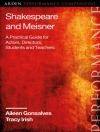Discussing the actor mutiny of 1733, theatre censorship, controversial plays and Fielding’s forgery of an actor’s biography, the book contends that some subversive Augustan and Georgian artists were early Brechtians. Reconstructions of lost episodes in theatre history include a recounting of Fielding’s last days as a stage satirist before his Little Haymarket theatre was closed, Charlotte Charke’s performances as Macheath and Polly Peachum in The Beggar’s Opera and the 1740 staging of Jonathan Swift’s Polite Conversation on a double bill with Shakespeare’s Merry Wives . . .
Some documents in this collection offer another perspective on theatre history by employing fiction – speculative reconstructions of Georgian theatre events for which historical facts are scarce or missing. Brecht also employed fiction to reconsider history in short stories he wrote about Lucullus and Socrates, and a novel about Julius Caesar. The stories and several new letters attributed to Fielding delve into theatre history and keep some of its controversy alive in new ways, historicizing fiction and theatre somewhat as Brecht did.
It offers an unconventional, new reading of theatre history, Brecht’s tradition and stage satire.
表中的内容
The Cast of Brechtians in Order of Appearance
List of Illustrations
Foreword by Peter Thomson
Introduction
Eighteenth-Century Brechtians
Cross-Dressing Soldiers and Anti-Militarist Rakes
Polly Peachum and the New Naiveté
Pirates and Polly: A Lost Messingkauf Dialogue
The Duchess of Queensberry Becomes Polly Peachum
Macheath Our Contemporary
Swift in Hollywood: Another Messingkauf Dialogue
Swift’s Polite Conversation with Falstaff
Henry Fielding, Brechtian Before Brecht
Fielding’s London Merchant, and Lillo’s
Literarization of Fielding’s Plays
Tom Thumb Jones, Child Actress
A World on Fire
Fielding’s Cibber Letters: Counterfeit Wit, Scurrility and Cartels
Bertolt Brecht Writes The Beggar’s Opera, Fielding Rewrites Polly
Stage Mutineers
Charlotte Charke’s Tit for Tat; or Comedy and Tragedy at War: A Lost Play Recovered?
Mrs Charke Escapes Hanging
Garrick and Swift’s School for Scandal—With a Digression on Yoko Ono
Brecht Praises Garrick’s Hamlet
A Portrait of the Artists as Beggar’s Opera Disciples—Including David Garrick, Epic Actor
Walpole in America
The Future of Eighteenth-Century Brechtiana: Polly Exonerated
Conclusion: The Future Promise of an Earlier Age
Eighteenth-Century Brechtians: A Timetable of Events
Bibliography
Index
关于作者
Joel Schechter is Professor of Theatre Arts at San Francisco State University. He is famous as a writer about clowns, jesters, satirists and their radical politics. Much of his work has been focused on contemporary global mayhem. He was previously Professor of Dramatic Literature at Yale School of Drama, lecturer in Performance Studies at New York University and the New School for Social Research. He was Editor in Chief of the Yale journal Theater from 1977-92.












